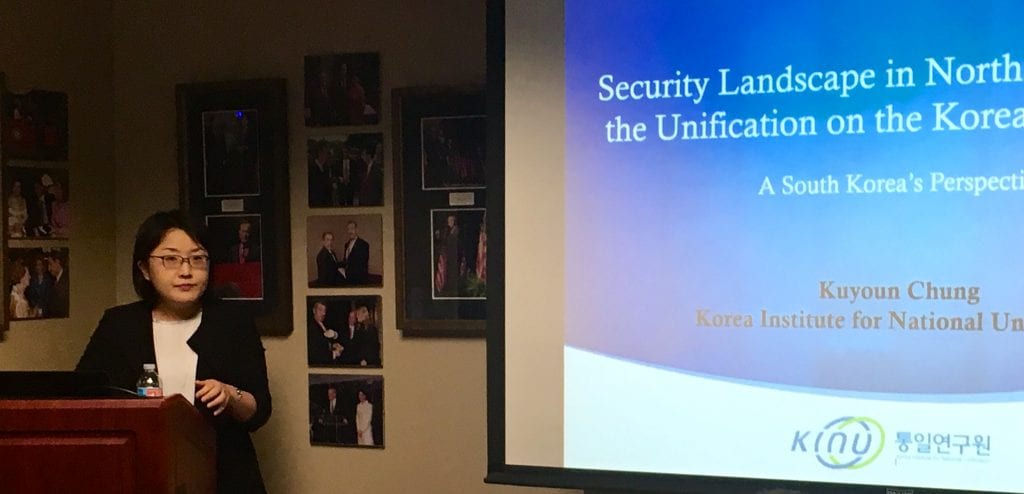
Kuyoun Chung, research fellow in the Korea Institute for National Unification (KINU)’s International and Strategic Division, came to SMU to give the talk “Security of the Korean Peninsula” Nov. 11 as part of the Tower Center’s Sun and Star program. She came fresh from a three-day strategic dialogue in D.C. with think tanks, state department officials, and U.S. military officials to speak to us.
At the beginning of every new South Korean administration, the leaders come together to create a unification policy. Its current administration, under President Park Geun-hye, hopes to achieve unification by ending the current cycle of provocation and compensation and replacing it with enough trust to begin a new cycle of denuclearization and collaboration. Until Korea resolves the fundamental incompatibility between its hopes of unification and the international strategy of deterrence, pressure, and sanctions, Chung says it will be difficult to establish such trust. Given the steady increase in sanctions and North Korea’s dual strategy of nuclear and economic development, it is easy to understand the title of Chung’s first slides: “fading hopes for unification.”
Today, she argues there are two possible ends for the 60-year-old conflict. One possibility is for North Korea and the U.S. to reach a peace treaty, which would require recognizing North Korea as a sovereign nation. American recognition would leave the Korean peninsula divided between two hostile nations. Alternatively, Dr. Chung believes the path to unification would proceed from North Korean regime change.

Chung also emphasized the different goals of the major stakeholders in East Asia. The United States and Japan share a vision of a united Korea as a liberal democracy operating in a market economy, a nation that would be friendly to the U.S.-Japanese alliance. China’s ideal form of unification emphasizes its concerns about a U.S.-Japan-Korea triple alliance. It would prefer to see unification delayed until a self-determined nation could emerge without any need for an alliance with the United States.
In her concluding statements, Chung explained that progress towards unification would be a combination of urgency, initiative, and mobilization. She said that unification would be a gradual, generations-long process that would give time for the ideal circumstances to come about. Over the course of those generations, South Korea would have to strengthen its unification-oriented policies by nudging North Korea towards regime change and mobilize and coordinate international support around a unification policy.
During the question and answer session, Chung also discussed the need to prepare the people of South Korea for unification. Many members of the younger generation, who have trouble finding employment, oppose unification because they prefer to see South Korea’s economic resources used to improve their situation at home first. However, there are programs prepared as part of a campaign to emphasize the valuable aspects of unification to the North Korean people. The primary appeal would be the denuclearization of North Korea, eliminating a significant threat to South Korea.
When asked about the potential impact of President Donald Trump on Korea, she focused on his promises to remove troops from South Korea and Japan. This, Chung explained, would significantly alter the balance of power in Asia, giving China the opportunity to expand its influence. Greater China influence would push unification efforts closer to China’s vision.
 A.J. Jeffries is from Downers Grove, Illinois, and he is triple majoring in history, economics, and public policy with a double minor in philosophy and public policy. He is a Highland Capital Management Tower Scholar, and when healthy, he can be found in the center of the midfield for the SMU soccer team. Off the field, he enjoys writing for the honors newspaper, Hilltopics, cooking, and reading.
A.J. Jeffries is from Downers Grove, Illinois, and he is triple majoring in history, economics, and public policy with a double minor in philosophy and public policy. He is a Highland Capital Management Tower Scholar, and when healthy, he can be found in the center of the midfield for the SMU soccer team. Off the field, he enjoys writing for the honors newspaper, Hilltopics, cooking, and reading.